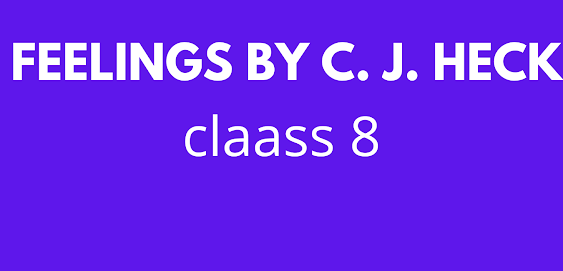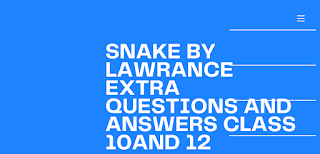FEELINGS BY C. J. Heck questions answers
Explanation FEELINGS BY C. J. Heck stanza wise
In the first stanza, the kid is the speaker. He's inquiring his mother why other kids his age say hurtful things to him. He is taken aback when he realizes they are unconcerned about other people's feelings. The child inquires as to whether it is tough to contemplate before acting.
In this stanza, the mother is the speaker. She is attempting to persuade the child of the main cause why bullies target physically weaker people in this stanza. According to her, bullies are enraged and unhappy inside too. They simply do not know how to cope with all of their negative emotions, so they bully others.
Within the third stanza, the kid repeats what his mother has previously told him. The mother then said that life is way too short to be angry and that piling up anger and sadness within oneself is the worst thing one can do. Happiness, she claims, grows more quickly and easily than anger. As a result, one should be cheerful. That appears to be a better way of life.
The mother advises the child in the final stanza to always stand up with his own feelings. She also stated one should not be angry while doing so and should do so in a positive manner. According to the child, being joyful and polite to everyone is not always easy, especially when you know that same person will say harsh things to you.
Q . In stanza 3, what does the mother say to her child about happiness?
Ans. Happiness grows far faster than anger, the mother explains to the youngster. She also urges the child to be joyful because that is the best way to live.
Q.. What are some consequences of allowing your anger to fester?
Ans. Allowing anger to fester can have disastrous repercussions. Anger is a waste of time that can spiral out of control, leading to even greater unhappiness and hatred.
Q.In the final verse, what advice does the mother give?
Ans: The mother has asked the child to speak up about his feelings in the last stanza. She has also instructed the child to do so in a pleasant and courteous manner, without becoming enraged or irritated with anyone. Anger, she believes, has the potential to damage things.The mother encourages the child to express himself, to be aggressive, but to do it in a calm and friendly manner.
Q.. What are the children's comments in the poem?
Ans. In the poem, the kids say things that upset the poet's feelings.
Q.Why are the children's comments hurtful to the speaker?
Ans. The statements made by the children were hurtful to the speaker since they were untrue.
Q.Why is it so difficult to be nice all of the time?
Ans: Being nice isn't always easy because it takes a lot of effort to keep one's emotions in check and suppress anger. Also, knowing that they will say hurtful things makes it difficult to be nice to them at times.
Q.Do you believe the child is describing a genuine or imagined situation? Provide justifications for your response.
Ans. I believe the boy is describing a real-life scenario that occurred to him at school or while playing in the park. When he returns home, he tells his mother everything, and she gives him sound advice.
Q. Do you believe the mother is aware of the child's issue? Justify your answer.
Ans. Because she has gone through this phase herself, the mother, in my opinion, understands the child's dilemma. As a result, she is capable of providing wise guidance to the youngster.




Comments
Post a Comment